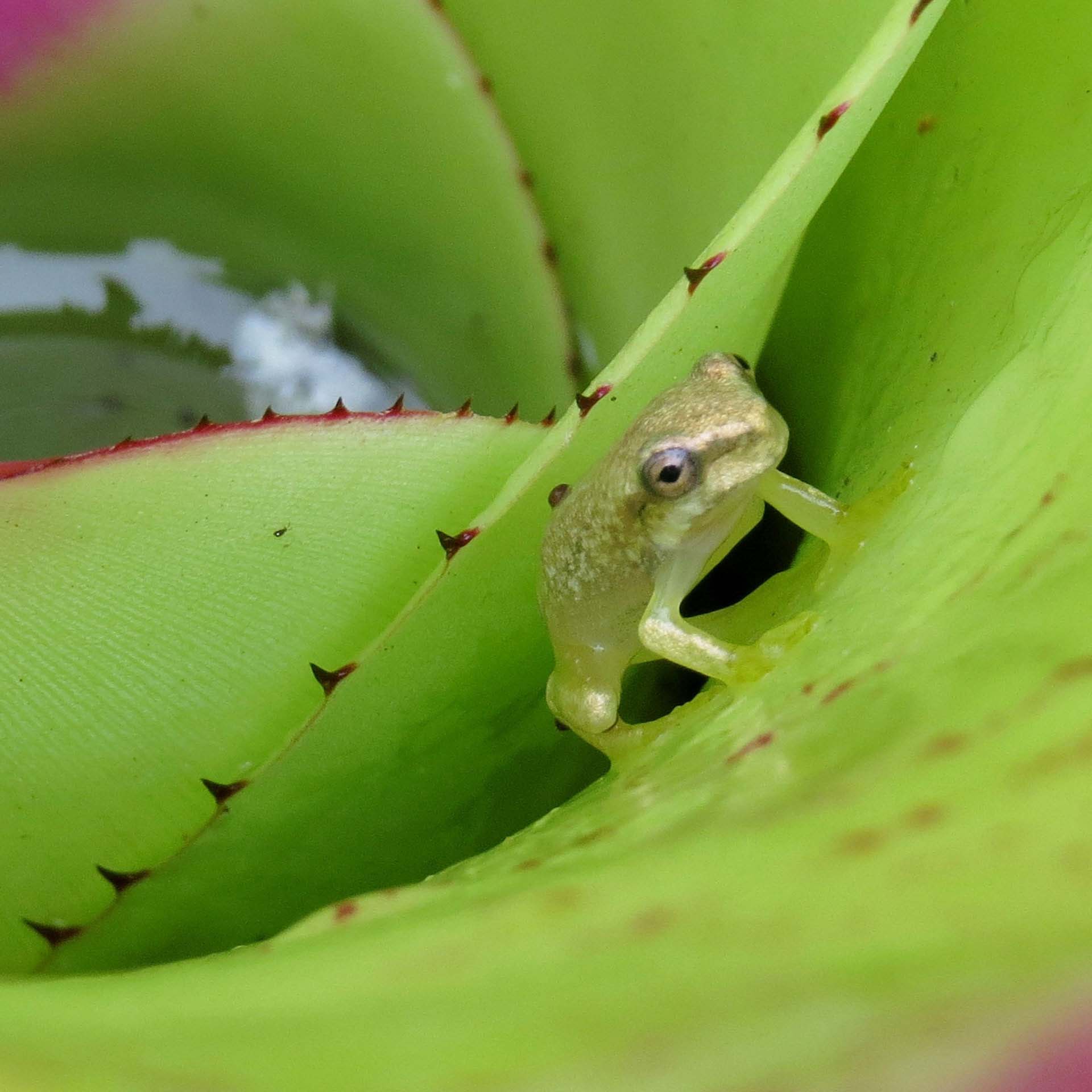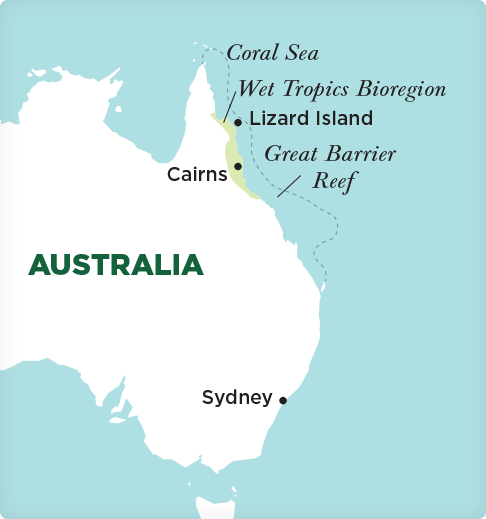Credits
16
Prerequisites
Relevant previous coursework
Courses taught in
English
Dates
Jan 31 – May 15
Program Countries
Australia
Program Base
Cairns
Critical Global Issue of Study
Climate & Environment

Study the ecological patterns and human influences affecting Australia’s two most diverse environments: the Wet Tropics Bioregion and the Great Barrier Reef.
16
Relevant previous coursework
English
Jan 31 – May 15
Australia
Cairns
Climate & Environment
Situated between the Wet Tropics Bioregion and the Great Barrier Reef, Cairns is the ideal base for exploring this incredibly diverse region and its human inhabitants. In this globally significant ecological setting, you will learn to read the landscape and conduct marine, terrestrial, and anthropological fieldwork in a cross-cultural context.
Travel throughout North Queensland, exploring different ecosystems with high biodiversity and landscape values. From bushland to rainforest to the Great Barrier Reef, you’ll practice fieldwork techniques and observe some of Australia’s unique animal species. Through the program’s strong partnerships with researchers, you’ll have opportunities to network, build skills and experience, and participate in an existing research project.
Previous college-level coursework or background in environmental studies, ecology, biology, or related fields, as assessed by SIT.


Investigate how traditional Aboriginal culture views and interacts with the environment on a weeklong camping trip guided by Aboriginal instructors. Explore your environs and discuss survival in the Australian wilds. Learn how the environment affected the development of the world’s oldest living culture and discover contemporary problems Aboriginal culture faces. Discuss ways Australian society can reconcile its sometimes violent and tumultuous past with a future that includes the first Australians.
For 10 days, you will identify organisms and develop your knowledge of the phylogeny, taxonomy, and life history of the region’s biota, becoming an “expert” on local flora and fauna. Develop your observation skills and knowledge of forest physiognomic characteristics. Wake to the “dawn chorus,” a cacophony of birds such as the chowchilla, eastern whipbird, and superb fruit dove. At night, spot leaf-eating possums, bandicoots, flying foxes (large fruit-eating bats), and pademelons (a miniature kangaroo).
The Wet Tropics rainforests serve as an outdoor laboratory in which you can examine the links between geology, geomorphology, climate, human activity, and the ecological systems of the Wet Tropics and learn to predict the effects of biophysical factors on the structural and floristic development of biotic communities in any landscape. Within this environment, you will complete a two-day field study to develop a research question and methods of research, and you will analyze and report your findings to the group.
Develop an in-depth understanding of coral reef ecosystems and conservation and management issues during a 10-day stay at Lizard Island Research Station on the Great Barrier Reef. Ride in one of the station’s small boats to access the diverse reefs surrounding the island and collect data for a scientific report. When not in the water or at lectures, you may interact with researchers working at this world-class research facility. Many past students have collaborated with researchers on their Independent Study Projects.
While on Lizard Island, spend five to six hours in the water each day during morning and afternoon snorkeling sessions, where you’ll learn how to collect data underwater, identify major coral groups, and observe reef fish families. You’ll also explore reef habitats around the island, observing how environmental parameters influence reef structure and species composition. On your snorkeling excursions, you are likely to see marine turtles, stingrays, octopuses, and the occasional moray eel.
Please note that SIT will make every effort to maintain its programs as described. To respond to emergent situations, however, SIT may have to change or cancel programs.
Upon successful completion of the program, students will be able to:
The following syllabi are representative of this program. Because courses develop and change over time to take advantage of dynamic learning opportunities, actual course content will vary from term to term.
The syllabi can be useful for students, faculty, and study abroad offices in assessing credit transfer. Read more about credit transfer.
Rainforest, Reef, and Cultural Ecology Seminar – syllabus
(ENVI3000 / 6 credits)
An interdisciplinary course with lectures, discussions, and required readings that develop students’ knowledge and appreciation of the species- and systems-level ecological patterns, processes, and human influences affecting the Wet Tropics and Great Barrier Reef bioregions. Resources utilized in the delivery of course content may include the Lizard Island Research Station and Wet Tropics Management Authority. Students may also learn from Aboriginal elders.
Environmental Field Study Seminar – syllabus
(ENVI3500 / 4 credits)
A course in research methods in both the social and natural sciences. The main focus is on learning how to collect, analyze, integrate, and report social and ecological data. Students will develop the capacity for critical understanding and evaluation of program-related environmental issues. The seminar is a springboard for the Independent Study Project, which includes consideration of field study ethics and the World Learning / SIT Human Subjects Review Policy. Field studies include designing and implementing reef and rainforest research projects, writing a research proposal, interviewing, surveying, and maintaining a field journal. Specific ecological field study methods may include micro- and macro-habitat analysis, biotic sampling and analysis, fauna and flora identification, biodiversity monitoring, population analysis, animal behavior, climatic analysis, and map reading.
Independent Study Project – syllabus
(ISPR3000 / 6 credits)
Students spend the last five weeks of the program conducting original, independent research on a subject of their choice at a location appropriate to your topic. For many students, the independent study project (ISP) is the highlight of their academic experience in Australia. It allows students to take the information they acquire from thematic coursework and field study and use it to design, implement, analyze, and write a scientifically valid research report. Through students’ own initiative, they will network and collaborate with Australian experts. Many students have made lasting professional connections during their ISP.
Sample ISP topics have included:
Browse this program’s independent study projects / undergraduate research.



SIT Study Abroad is committed to ensuring that international education is within reach for all students. We believe in the transformative power of immersive, intercultural experiences and are dedicated to supporting students in their educational journey.
See Full Breakdown
A critical step in preparing for your study abroad program is planning how you will maintain your health and wellbeing. Please review the following information carefully and contact [email protected] with any questions or concerns.
View Information
Read Swarthmore student Natalie LaScala’s article on brush turkeys in The Phoenix.
Read Joel Abraham’s (Yale University) Independent Study Project. Reproduced with permission from The Victorian Naturalist, published by The Field Naturalists Club of Victoria, Australia, since 1884.